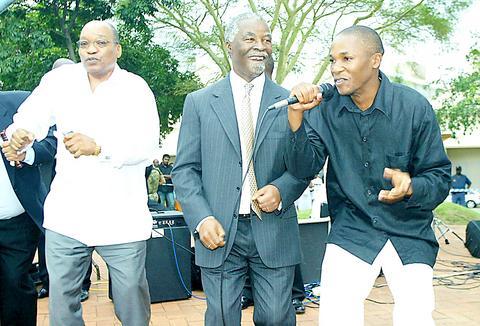South Africa's ruling party vowed on Saturday it would not abandon draft legislation calling for the confiscation of farmland for redistribution to the nation's landless.
A senior African National Con-gress (ANC) official, Jeff Radebe, said under a proposed land reform bill farmers unwilling to sell land would be forced to do so.
"If the bill becomes law, it will be implemented," he told reporters in the eastern port city of Durban.

PHOTO: AP
Some fear a Zimbabwe-style land seizure program in South Africa.
The often-violent seizures of thousands of white-owned farms in Zimbabwe since 2000 disrupted the farming production of South Africa's northern neighbor and crippled its agriculture-based economy.
South African President Thabo Mbeki's government has promised a program of land reform to hand over land to impoverished black claimants including workers whose families have lived on white-owned farms for several generations.
Before South Africa's first all-race elections in 1994, about 60 percent of the country's most productive land was owned by white South Africans.
Nearly 90 percent of commercial farmland remains in the hands of some 50,000 white farmers.
Draft land reform laws have still to be presented to the South African parliament.
Radebe, unveiling the ruling party's manifesto ahead of presidential and parliamentary elections later this year, said the party will fight the polls on a platform of a "people's partnership" to cut unemployment and poverty by half in the next decade, the South African Press Association reported from Durban.
No election date has yet been set.
"In the next five years and the coming decade we will focus on alleviating poverty and creating jobs. The ANC and the government cannot do these things on its own. We need a partnership with the people," he said.
Radebe said since 1994 the economy had grown by 2.8 percent and between 1996 and last year two million new jobs were created.
But more than a million jobs were lost in the last decade and the number of people seeking jobs increased.
Radebe said economic policy would strive to keep debt, interest rates and inflation low. It would also stress "broad-based black economic empowerment" in the nation of about 45 million people, nearly a tenth of them white.
Mbeki, running for a second five year term in this year's polls, is scheduled to formally launch the party's manifesto in Pietermaritzburg in the eastern KwaZulu-Natal province today.
The province is controlled by the opposition Inkatha Freedom Party (IFP), a bitter rival of the ANC during bloody clashes in apartheid-era South Africa.
The IFP became of a coalition partner in the government for several years.
The coalition collapsed midway through the current five-year parliament term that ends in April.
Ruling party officials said the launch of their election campaign and manifesto by Mbeki in KwaZulu-Natal was aimed at helping win control of the province.
"The mood that one has felt in the province ... is positive. In the rural areas, the ANC is received with warmth. We need to translate this into registered voters who will vote for the ANC," Radebe said.

Auschwitz survivor Eva Schloss, the stepsister of teenage diarist Anne Frank and a tireless educator about the horrors of the Holocaust, has died. She was 96. The Anne Frank Trust UK, of which Schloss was honorary president, said she died on Saturday in London, where she lived. Britain’s King Charles III said he was “privileged and proud” to have known Schloss, who cofounded the charitable trust to help young people challenge prejudice. “The horrors that she endured as a young woman are impossible to comprehend and yet she devoted the rest of her life to overcoming hatred and prejudice, promoting kindness, courage, understanding

Tens of thousands of Filipino Catholics yesterday twirled white cloths and chanted “Viva, viva,” as a centuries-old statue of Jesus Christ was paraded through the streets of Manila in the nation’s biggest annual religious event. The day-long procession began before dawn, with barefoot volunteers pulling the heavy carriage through narrow streets where the devout waited in hopes of touching the icon, believed to hold miraculous powers. Thousands of police were deployed to manage crowds that officials believe could number in the millions by the time the statue reaches its home in central Manila’s Quiapo church around midnight. More than 800 people had sought

‘DISRESPECTFUL’: Katie Miller, the wife of Trump’s most influential adviser, drew ire by posting an image of Greenland in the colors of the US flag, captioning it ‘SOON’ US President Donald Trump on Sunday doubled down on his claim that Greenland should become part of the US, despite calls by the Danish prime minister to stop “threatening” the territory. Washington’s military intervention in Venezuela has reignited fears for Greenland, which Trump has repeatedly said he wants to annex, given its strategic location in the arctic. While aboard Air Force One en route to Washington, Trump reiterated the goal. “We need Greenland from the standpoint of national security, and Denmark is not going to be able to do it,” he said in response to a reporter’s question. “We’ll worry about Greenland in

PERILOUS JOURNEY: Over just a matter of days last month, about 1,600 Afghans who were at risk of perishing due to the cold weather were rescued in the mountains Habibullah set off from his home in western Afghanistan determined to find work in Iran, only for the 15-year-old to freeze to death while walking across the mountainous frontier. “He was forced to go, to bring food for the family,” his mother, Mah Jan, said at her mud home in Ghunjan village. “We have no food to eat, we have no clothes to wear. The house in which I live has no electricity, no water. I have no proper window, nothing to burn for heating,” she added, clutching a photograph of her son. Habibullah was one of at least 18 migrants who died